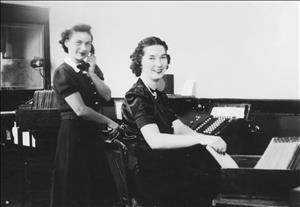Here Dorothea (Pfister) Nordstrand (1916-2011) remembers her first job, obtained in the Green Lake neighborhood near her Seattle home. She was 17 years old, and the Great Depression was on. In 2009 Dorothea Nordstrand was awarded AKCHO's (Association of King County Historical Organizations) Willard Jue Memorial Award for a Volunteer, for contributing these vivid reminiscences to various venues in our community, including HistoryLink.org's People's History library.
My First Job
A few days ago, I overheard part of a conversation between two young people who were about to be graduated from college. They were discussing the kind of employment they hoped to have offered to them. The prime requirements were salary and "fulfillment." I was reminded of my own introduction into the world of business.
Graduation from high school in 1934 plunged me smack into the midst of the Great Depression. Men and women with many years of experience in the job market were out of work and standing in line for any kind of employment. There was no unemployment insurance at that time. People were hungry and willing to work at anything for a paycheck. It was a chilling introduction into the real world. Any job I was qualified for could be filled by someone with years of valuable experience to offer.
At the time I attended, Seattle Public Schools offered two separate courses of study to their students. Beginning in junior high school, we were given the option of taking classes to prepare us for college or classes to take us into the work force directly from high school. With the difficult financial situation at home (Daddy had been crippled in an accident), there had never been any hope of college for us kids, so I took the Commercial Course. Instead of Algebra, Geometry, and a foreign language, my training included Business Arithmetic, Bookkeeping, Business English, Commercial Law, Shorthand, and Typing.
My sister, Florence, with the same training, had been able to find employment as bookkeeper-teller with Green Lake State Bank, near our home. Thankfully, she was established in her job before the depression hit. Our family was dependent on what my sister could contribute from her modest salary and the room-and-board money that came from the two young men who rented our spare bedroom.
I wanted a job desperately to be able help at home, but employers were reluctant to hire an inexperienced seventeen-year-old who looked even younger. When I found a place where I could expect to be considered, it involved knowing how to use a comptometer (a specialized figuring- machine used in most offices at that time) and a bookkeeping machine, neither of which had been included in my training. I applied for every job opening I could find, meantime earning what I could by baby-sitting for 25c an hour, including light housework. It seemed hopeless.
Then, Florence asked Mr. Lear, president of the bank where she worked, if I might be allowed to come in to learn to work the machines they used. He was skeptical at first, then agreed under condition that I work a full 8-hour day like the rest of the girls, but without a salary. To me, this was like a present from Heaven. I would get much the same training I would have received at a business college . . . training we simply couldn't afford. I would also gain EXPERIENCE to add to my High School Diploma and Certificate of Proficiency in Business Training.
I worked under those conditions for the next three months, happily learning by doing. Then, my sister left to get married and I was hired into her position. The job paid me $50 a month. The first $35 went to Mom to help at home. Then $15 was mine, of which $5 went immediately into a savings account and the remaining $10 was usually spent for shoes and clothes. At that time, shoes could be bought from shoe stores like Block's, for $1.98, and a dress from Lerner's ran to $4 or $5. I sewed most of my own clothes, so I was well-dressed on my little income.
I stayed with Green Lake State Bank for 10 years, filling, in turn, every position they had to offer, from bookkeeper-teller, to head teller, insurance secretary, loan secretary, private secretary to the president, and finally earned the title of Assistant Cashier. The next step up would have been Vice President, but there was little hope of getting that one as it was held by the president's brother-in-law.
I loved that place. It was so nearby that I walked home midway through the day to have lunch with Mom and Dad. The bank had a policy of hiring only local people, so my co-workers were my friends outside of office hours. We were expected to know our customers by name, which also soon made them friends. My walk to and from work brought me "hellos" from everyone I met along the route.
I never made a lot of money, but there were a lot of fringe benefits. I worked at a job I liked and was good at, I was able to contribute to my family's income, and I enjoyed recognition and respect within my neighborhood. I was "Miss Pfister, who works at the bank."
That was true fulfillment.

